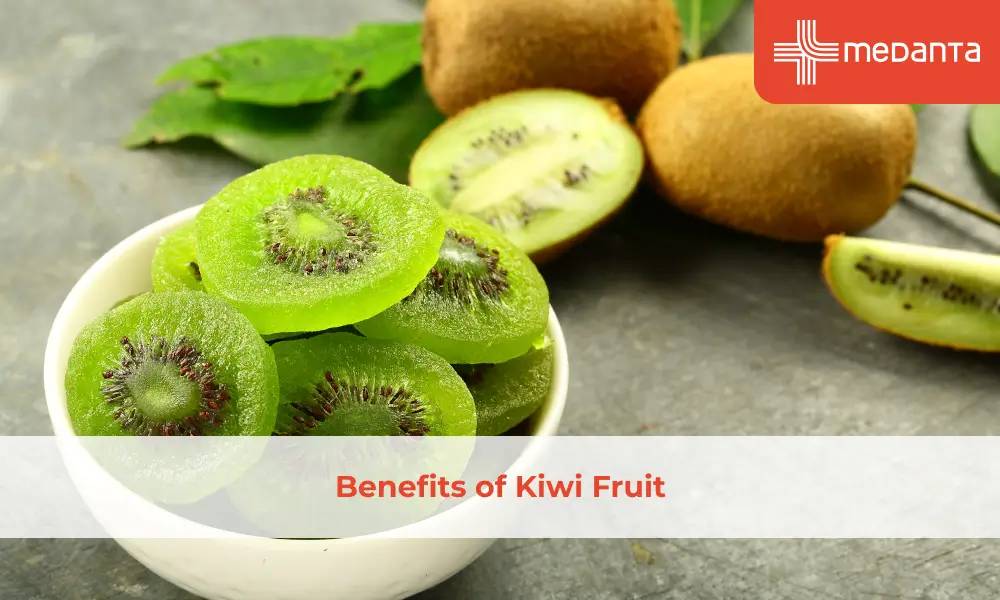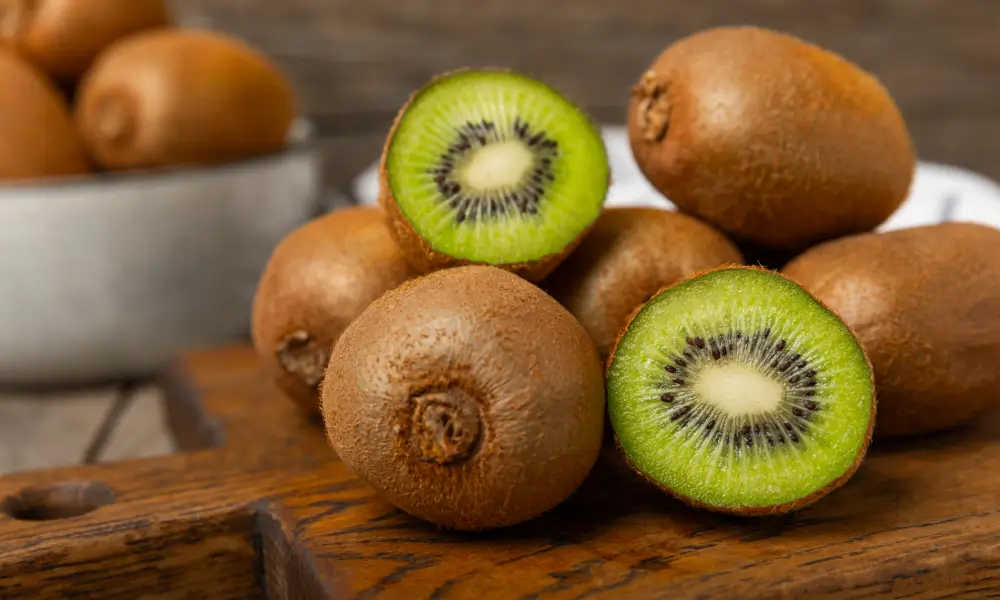Benefits of Kiwi Fruit - Nutrition Facts, Health Benefits, Digestion

TABLE OF CONTENTS
Kiwi fruit goes way beyond the reach and influence of its exotic looks. A single kiwi contains more vitamin C than two oranges. This small, fuzzy green fruit delivers powerful nutrition that supports everything in human health.
Kiwifruit stands out with its rich nutrient content including vitamin C, potassium, vitamin E, and dietary fibre. Studies show amazing health benefits when you keep taking them. Two kiwis a day for four weeks can help improve bowel movements in people with constipation. Regularly eating kiwis also lowers blood pressure. The antioxidants in kiwi don't just help digestion and heart health - people who eat more of them have a lower risk of heart disease, cancer, and death from any cause.
Nutrition Facts of Kiwi Fruit
A medium kiwi (75g) gives you:
Calories: 48
Carbohydrates: 10.5g
Dietary fibre: 2g
Total sugar: 7g (no added sugar)
Protein: 1g
Fat: 0.4g
Vitamin C: 56mg (62% of daily needs)
Vitamin K: 30mcg (25% of daily needs)
Potassium: 148mg (3% of daily needs)
Kiwi fruit also provides folate and copper that are great ways to get better immune health.
Top Health Benefits of Kiwi Fruit
Immunity Booster: Kiwis pack more than 230% of your daily vitamin C needs. This helps your immune system respond better and curb seasonal illnesses. Just one kiwi gives you up to 80% of your daily vitamin C need.
Digestive Health Champion: Kiwi has a mix of soluble and insoluble fibre which improves bowel movements and reduces constipation. The fruit contains actinidin, a unique enzyme that breaks down proteins and helps digestion in both the stomach and intestines.
Skin Rejuvenator: Kiwi's rich content of vitamins C & E shields your skin from oxidative damage and helps produce collagen. This keeps your skin youthful and speeds up wound healing.
Heart Health Guardian: Your blood pressure and cholesterol levels improve with regular kiwi consumption. Research shows that eating three kiwis daily for eight weeks reduces blood pressure better than eating one apple per day.

How Many Kiwis Should You Eat Per Day?
According to many research if you are eating two kiwis daily, you can get the best out of it without side effects. Studies showing major health improvements used 2-3 kiwis per day for 4-8 weeks. Two kiwis daily for four weeks can give you relief from constipation.
Best Time to Eat Kiwi for Maximum Benefits
Starting your day with kiwi provides vitamin C that fights tiredness and fatigue. If you eat kiwi before or after having a protein rich meal, your body digests protein in a better way (thanks to the actinidin enzyme in kiwi). For people with sleep issues, eating kiwi about an hour before bed can give them a good night's sleep (due to its serotonin content).
Complications and Precautions
Side Effect | Details | Precaution |
Allergic reactions | Can cause itching, swelling, hives, or difficulty breathing | Avoid if allergic to latex, avocados or bananas |
Medication interactions | May slow blood clotting and boost the effects of blood pressure medications | Ask your doctor if you take anticoagulants or blood pressure medication |
Kidney stone risk | High in oxalates | Avoid if you have kidney stones |
Oral irritation | The actinidin enzyme might cause a tingling sensation | Cut back if symptoms appear |
Conclusion
Kiwi fruit packs impressive nutritional power despite its small size. This fuzzy green gem delivers an array of health benefits. A single kiwi contains more vitamin C than two oranges put together & can be your best immunity shield during cold seasons.
The fruit's unique combination of fibres and the special actinidin enzyme does wonders for your digestion. Your heart benefits too - eating kiwis regularly keeps blood pressure levels healthy and balances cholesterol.
Looking for gorgeous skin? Kiwis support collagen production and fight harmful oxidative damage. Research suggests that eating two kiwis daily provides optimal benefits without side effects. You might enjoy them in the morning for energy, with protein meals to boost digestion, or before bed to sleep better
Ready to add this nutritional superstar to your daily diet? Kiwi fruit's sweet-tart flavour and impressive health profile make it worthy of a special place in your fruit bowl. Your body will thank you!
FAQs
What are the main health benefits of kiwi fruit?
Kiwi brings several health benefits to your body:
The unique mix of fibre and actinidin enzyme helps your digestive health
Your blood pressure drops more than with apples if you keep taking them
Your blood clots less, the natural way
You sleep better when you eat it before bed
Your cholesterol stays at healthy levels
How many kiwis should I eat daily?
Two kiwi fruits a day will give you the best results. Research shows this amount is safe and won't affect your metabolism negatively.
What is the nutritional value of kiwi fruit?
A medium kiwi (75g) gives you:
Calories: 48
Carbohydrates: 10.5g
Dietary fibre: 2g
Total sugar: 7g (no added sugar)
Protein: 1g
Fat: 0.4g
It is a special fruit with an exceptional vitamin and mineral source.
Is the kiwi fruit good for the skin and hair?
Yes! Kiwi makes your skin and hair better through:
Vitamin C that helps make more collagen for elastic skin
Antioxidants that fight early ageing signs
Vitamin E that fixes damaged hair
Minerals that make your scalp circulation better and strengthen hair roots
Can kiwi fruit boost immunity?
Kiwi substantially boosts your immune system. Each kiwi packs over 60% of your daily vitamin C needs. Research shows vitamin C:
Gets more white blood cells and thus encourages more production
Protects your cells from damage as an antioxidant
Makes neutrophils (first infection-fighting cells) work better
Makes upper respiratory infections shorter and milder
What is the best time to eat kiwi fruit?
Kiwi works well throughout your day:
Morning time gives you vitamin C to fight tiredness
Eating with protein meals helps digest protein better through the actinidin enzyme
An hour before bed might help you sleep better
Empty stomach helps your body detox and energise
Are there any side effects of eating kiwi fruit?
While kiwi is mostly safe, you should watch out for:
Allergic reactions, especially if you're allergic to latex, avocados or bananas
Your mouth might feel irritated from the actinidin enzyme
Blood might thin more - importantly if you take blood thinners
High oxalate levels could raise kidney stone risks
Blood pressure medicines might work strongly






